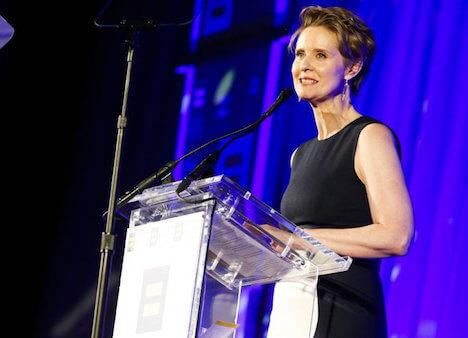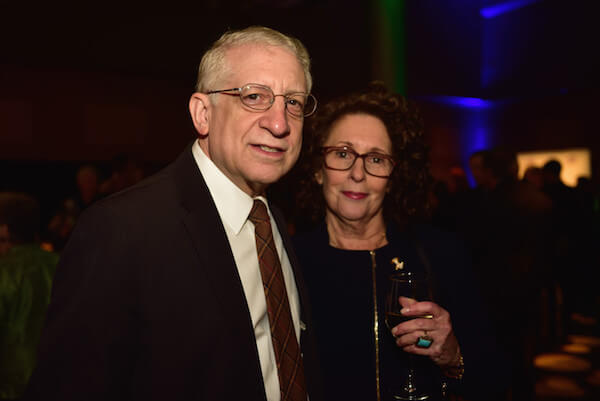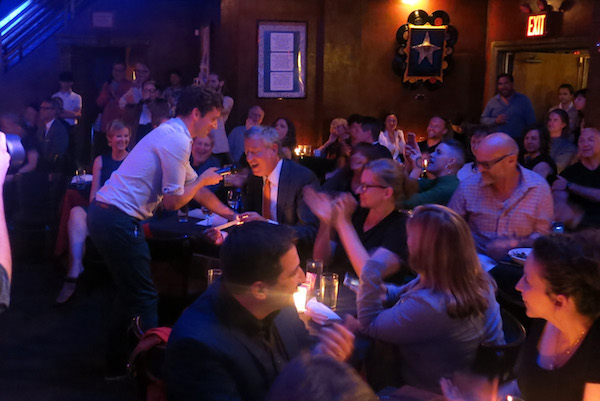Tonya Pinkins and Dianne Wiest in Joel Drake Johnson’s “Rasheeda Speaking,” directed by Cynthia Nixon. | MONIQUE CARBONI
We live in a post-racial society. At least that’s what the average American wants to believe. Ask anyone if they’re guilty of racism and chances are they’ll be galled and fiercely deny it.
Yet studies — and recent news headlines — suggest otherwise. In truth, sometimes there is a yawning, murky gap between what we consciously think and how we behave. It’s this chasm that “Rasheeda Speaking,” by Joel Drake Johnson, dares to scrutinize.
The central figures in this uneven yet provocative offering from the New Group are two co-workers at a nondescript doctor’s office in present-day Chicago. Jaclyn (Tonya Pinkins), a self-assertive black woman prone to acute respiratory attacks who joined the staff relatively recently, is viewed as rude to patients. Ileen (Dianne Wiest), a timid, squirrelly white woman who has worked there for several years, is asked by Dr. Williams (Darren Goldstein) to document any offending behavior as ammunition to get Jaclyn fired.
Once Jaclyn figures out what’s going on, she thwarts their evil plan with a more diabolical one of her own. Tables are turned and then toppled over.
Dr. Williams gripes that “Jackie” (he ignores her real name) doesn’t look him in the eye and can’t be trusted. Jaclyn thinks the doctor looks right through her because he disapproves of black people socializing with white people. Is this conflict due to cultural, racial, or gender bias, or is it just two folks who, pardon the pun, don’t see eye to eye?
Not that “Rasheeda Speaking” is solely about racial tensions. The drama shrewdly intuits the power shifts and prickly politics that can arise in any workplace. Jaclyn returns from a weeklong absence (she’d suffered a panic attack or toxin allergy or both) to find her plants wilted from lack of water, her desk piled with junk, and the twitchy Ileen promoted to office manager.
“But there’s only two of us,” says Jaclyn incredulously, realizing that Ileen’s job now is to check up on her. She ridicules Ileen for looking “pale and puffy” and warns, in all seriousness, that poisonous rays emitted from the computer are stealing Ileen’s color.
If the 90-minute drama registers as a bit clumsy, it’s not necessarily the fault of the multitalented Cynthia Nixon, who should be commended for tackling such a fraught tinderbox of a play for her directorial debut. As written, certain moments feel contrived and stretch credulity; behind the poignancy, we are often too aware of Jackson’s intentions. It’s like watching a production of “Peter Pan” where the fly wires are replaced by heavy-gauge steel chains.
Would an elderly patient like Rose (the ever-reliable Patricia Conolly) really suggest to a receptionist like Jaclyn that her attitude problem was somehow motivated by “a revenge for slavery?” Highly doubtful.
A terrific cast goes far to overcome the machinations. Pinkins mines a streak of gentle vulnerability within Jaclyn, earning our empathy even as she connives with impunity. Wiest is well cast as the dedicated, bumbling office manager clearly out of her depths.
The overriding message seems to be: Everyone’s a little bit racist. Which, come to think of it, is the title of a hilariously trenchant ditty from the puppet musical “Avenue Q,” executed with a panache that’s only occasionally displayed here.
And if you’re wondering where the titular Rasheeda comes in, she’s the subject of a story recounted by Jaclyn about a group of rowdy young professionals on her daily bus commute. The “pretty white men” mock the hardworking, middle-aged black women on the bus, and Rasheeda is their derogatory code name.
Never mind that the passage is shoehorned into the proceedings. As delivered with quiet intensity by Pinkins, the magnificent monologue is by far the most potent moment of the play.
RASHEEDA SPEAKING | The New Group | The Pershing Square Signature Center, 480 W. 42nd St. | Through Mar. 22: Tue.-Fri. at 7:30 p.m.; Sat. at 2 & 8 p.m.; Wed., Sun. at 2 p.m. ; $77 at thenewgroup.org | 90 mins., no intermission



































